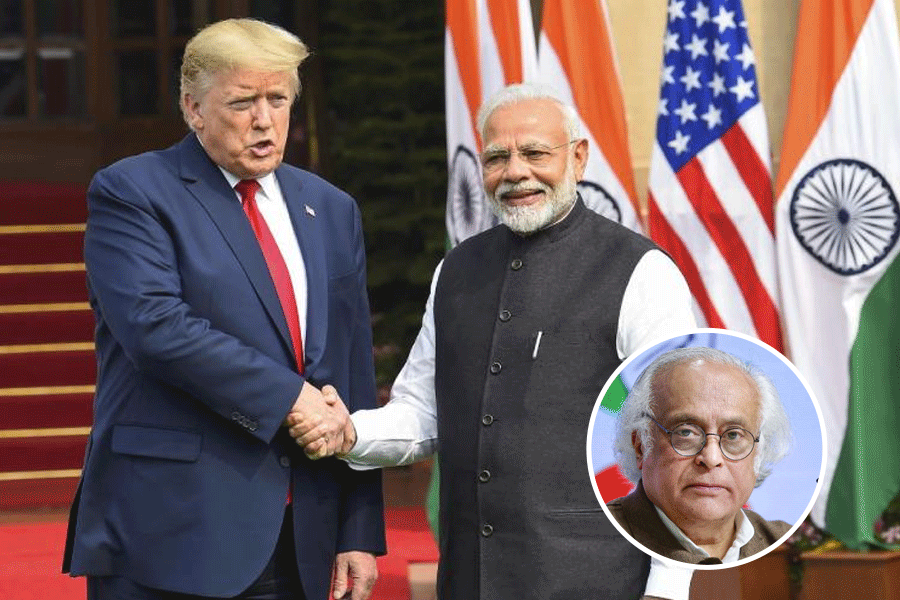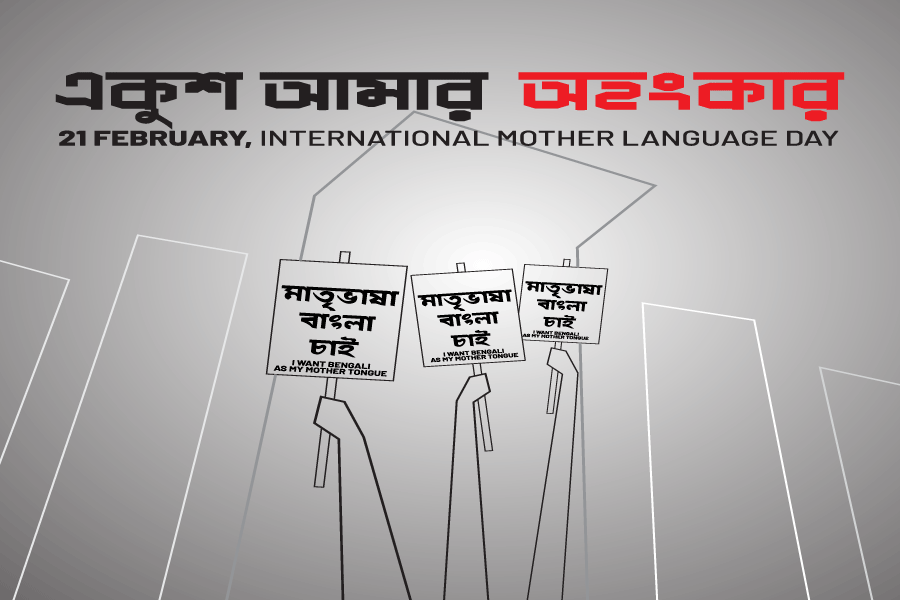Novel ritual
Sir — Sindoor khela has somehow become the cinematic shorthand for Durga Puja, much like rain has for romance and white pigeons for patriotism. It is fascinating that a ritual with no scriptural roots now carries such visual and emotional weight. Film-makers adore it, scholars debate it, and everyone else treats it as an annual ritual. What began as a quiet practice among Bengali women has turned into a national spectacle of vermilion and power poses. Perhaps that is the real miracle — how something that started outside the scriptures now steals every scene, both in temples and on-screen.
Sunaina Rawat,
Jaipur
Words matter
Sir — There is merit in calling out the double standards of Western media’s coverage of the war in Gaza (“Journalism that draws blood”, Oct 4). Gaza’s devastation is often buried under the language of ‘security operations’. This linguistic laundering dulls outrage. The pattern of sourcing news from official Israeli channels and treating Palestinian evidence as emotional testimony reflects bias. Debashis Chakrabarti’s anger against the quiet complicity that grows from editorial caution is justified. Journalism must confront that its hesitation can shield power. Silence is not neutrality; it is a position.
A.G. Rajmohan,
Andhra Pradesh
Sir— The charge that American journalism has collapsed morally assumes a uniformity that does not exist. Newspapers are ecosystems of dissent, often containing contradictions within the same day’s pages. Some writers defend Israel uncritically, others expose its actions with precision and horror. To accuse an entire press of complicity dismisses that internal contest. What journalism needs is not moral purification but editorial independence strong enough to withstand political lobbying and reader fury alike. Outrage can expose injustice, but generalisation obscures it.
Vijay Singh Adhikari,
Nainital
Sir — Two pieces, “Journalism that draws blood” and “Deceptive weapon” (Oct 1), highlighted the role of language and those who wield it on real-world issues like war. There is value in exposing how the language of war has been digitised. Artificial Intelligence, predictive analytics, and military jargon now produce the illusion of precision while expanding the licence to kill. “Algorithmic efficiency” sounds harmless until it describes the targeting of a family home. However, blaming only Western editors misses the deeper issue. The problem lies in a culture that treats data as truth and bodies as statistics. Journalism mirrors that world. The challenge is recovering words that mean something.
Mohammad Asad,
Mumbai
Useful lessons
Sir — Maureen Dowd’s recollection of Robert Redford and Paul Newman feels like an elegy for a kind of stardom that no longer exists (“Butch & Sundance”, Oct 3). Both men were uneasy with beauty and allergic to vanity, which may explain why their glamour endures. They aged into something better than legends: citizens. Dowd’s anecdotes remind readers that integrity, once a professional hazard in Hollywood, can also be its finest legacy. Today’s fame machine rewards noise over grace, yet the image of Redford quoting T. S. Eliot feels like civilisation briefly pausing to remember its manners.
H.N. Ramakrishna,
Bengaluru
Sir — Robert Redford’s warning about the erosion of constitutional rights now reads as prophecy. Long before ‘fake news’ became a thing, he understood how power hides behind patriotism. Dowd’s recollection of that 2003 lecture should be required reading in every newsroom. Redford’s films — All the President’s Men, The Candidate, Three Days of the Condor — were less political thrillers and more lessons in civic duty.
Sofikul Islam,
Calcutta
Sir — Maureen Dowd’s portrait of Robert Redford and Paul Newman works because it resists flattery. She does not canonise them; she observes them. The best line may be the quietest one: that Redford was “everything you hoped he would be.” It is rare to find celebrity writing that restores wonder without losing scepticism. Dowd manages both.
Pinaki Majumdar,
Calcutta
Keep it timely
Sir — For start-ups, a pending trademark is not a paper delay but a business hazard (“On the clock”, Oct 3). Investors hesitate, copycats thrive, and brand identity hangs in limbo. When Rule 50 of the Trade Marks Rules sets clear deadlines, prolonged silence from the registry amounts to negligence. The Rajasthan High Court’s reliance on Article 21 to ensure that trademark registrations are not kept pending is thus less judicial activism and more administrative correction. Speed is not a luxury in commerce; it is survival. The registry’s inefficiency erodes faith in India’s promise of innovation and fairness. But trademark registration is a technical process involving objections, oppositions, and verification. Not every delay is mala fide. The better path is institutional reform, including more examiners and digital accountability.
Sagar Chakraborty,
Calcutta










